I have just returned from a trip to the Cannes Film Festival and market. While I was there I learned about what it is like for the 200+ interns attending Cannes via the student programs run by the American Pavilion (“AmPav”).
I have subsequently spoken with over 30 interns about their experiences and will share below what I’ve found.
This is likely to be an evolving story. As I learn more I will update, correct and expand this article in response to the feedback and responses I receive. I have added a Change Log at the end to make it easy for you to see what’s been updated.
The American Pavilion 101
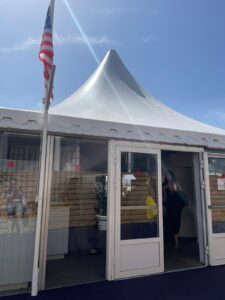
The annual Cannes Film Festival and Marche du Film are the most famous gatherings in the film calendar. Among the venues open to attendees are a number of “pavilions” along the beach, each from a different country. They act as a ‘home from home’ for film professionals, and as a way to promote each country’s offerings to the film community.
The American Pavilion (“AmPav”) is unusual as it is the only pavilion in Cannes to charge an entry fee. Festival attendees pay between $100 (the basic package bought in advance) and $1,100 (VIP access bought on-site) for access. For that, they get seats, wi-fi, free coffee, industry events and the chance to purchase drinks and food from the restaurant.
A major part of AmPav’s activity is its student program, which recruits over 200 US college students (aged between 17 and late 20s) and places them in a variety of internship positions.
AmPav’s program is the only student program officially recognised by the Cannes Festival. In 2007, Executive Director of the Marche du Film Jérôme Paillard said: “Although there are other student programs in existence at Cannes, they have no affiliation with the Festival or Marche. As we know that in the past some organisations have offered very low-quality programs to students mostly from the USA, we have decided to endorse only those few whose seriousness and quality we can vouch for“.
AmPav is owned by Penske Media, which also owns pretty much all the major film trade publications, namely The Hollywood Reporter, Deadline, Variety and IndieWire.
What the interns said they experienced

While in Cannes I heard about a few aspects of the AmPav internship program which concerned me. So I tweeted about it and invited students to reach out and share their experiences.
Five main themes emerged:
- Pay to participate
- Unpaid service jobs
- Accommodation
- Covid response
- Inappropriate behaviour
There were a few other minor concerns raised but I am focusing on the stories I heard over and over. Plus, interning is not fun at the best of times so I have filled a number of the other complaints under “Yes, interning is horrible”. That’s not to dismiss them but just to say that I want my focus to be on the aspects which I feel are beyond what a normal intern should expect to endure.
1. Pay to Participate

Each student is paying around $4,000 to intern at Cannes.
Among the things the students receive are an internship position, accommodation, airport pickup/dropoff, breakfast, AmPav events, accreditation and access to the pavilion. The fee does not include flights, most of their food and other travel/living costs.
I’m told that there are 223 students, 8 culinary students and 50 staff/volunteers. If this is correct, then we can calculate that the gross income paid by these interns is likely to be in the range of $900,000 to $960,000.
Most students said they spent upwards of $6,000 to be working in Cannes. This quote was representative of the experiences I heard about:
- “The cost of the program for early decision was $3,950. My flight was roughly $1,200… AmPav recommended to us to bring $1,500 for spending money. I spent nearly $400 on professional clothing that would be appropriate in the heat of the summer. I spent $600 on a tux and alterations. Writing all those numbers out makes me sick for what this program actually is. And the worst part is many of us, including myself, don’t have this money on hand, so we had to put most-to-all of it on credit cards!”
When I reached out, many of the companies where interns were placed were shocked to hear that their interns had paid to be working there.
2. Unpaid Service Jobs

The AmPav say: “Partner companies include talent agencies, production/distribution companies (both domestic and international), trade publications, and PR firms“. This is true, and a number of students said they had learned a lot from their positions.
However, one aspect left off that list is working in the actual pavilion. The pavilion hosts a number of events, private parties and is open to members during the day. They sell and serve a selection of food and drinks. Much of this work is carried out by interns in the program.
Here’s what the students had to say on the matter:
- “Working inside the pavilion consists of waiting tables, bartending, selling memberships, some scheduling of panels and round tables, and the relatively “lucky” few who are recording some events or panels. They’re jobs of necessity and we got shoved into them, mislead to think they would give us time to network”
- “They promise that the pavilion workers get to meet and interact with the celebrities brought in, but of course they don’t it’s just manual labor and they get in trouble for interacting with people”
The AmPav website explicitly tells students: “Please be sure to apply for a tourist visa.” (bold emphasis is theirs) and one student I spoke with said:
- “We were told beforehand that if we got stopped in customs and asked why we were in France to just say we are visiting the festival and not working there“
AmPav has assured me that their program meets all legal requirements (US and French), so it seems this is more a question of ethics than law.
3. Accommodation
Part of the fee goes towards the students’ accommodation. This is described by AmPav as: “Shared accommodation in a European-style residence apartment“.
In practice, it seems that most students do not have their own bed to sleep in. Here’s what a few students had to say on the matter:
- “The housing they “provide” is 3-4 people squished into 2 person rooms (during a pandemic), while harassing us about paying 200+ for premium rooms”.
- “Each room has 2 couches and 1 private bedroom for 3 students”
- “The residence we are staying in has 4 people stuffed into what is essentially a studio apartment”
4. Covid Response

Covid is still rampant in France, and all indications suggest that Cannes has been a hotbed of infections. This is not AmPav’s fault, and I understand that they have been following the protocols suggested by the Festival.
However, many students felt that AmPav was not prepared, was not taking enough steps to curb infections and was not suitably prepared to look after students once they were infected. I’ve been told that a large number of AmPav students currently have Covid, although due to medical privacy I cannot verify this myself.
Here’s what the students had to say on the matter:
- “They sent an email about wearing masks in the Pavilion yet that rule is still not enforced. They sent an email about doing temperature tests yet that is not enforced. The food provided for us is served buffet style with no utensils so people are often grabbing it with their hands”
- “The covid response has shown that they were not prepared at all”
- “They didn’t have any covid tests so I had to buy my own”
5. Inappropriate Behaviour
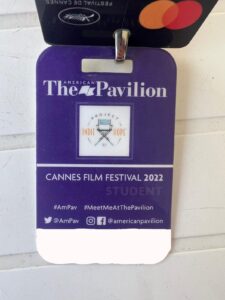
It is a sad fact that the film industry contains some people who act in wholly unacceptable ways. This covers everything from unprofessional behaviour, derogatory words, right through to systemically preying on others for their own gratification.
Cannes only exacerbates this, due to the frenetic nature, clear power imbalances and the feeling of being away from normal structures/norms.
I haven’t heard any suggestion that any AmPav personnel acted in any way inappropriately themselves. Some students expressed relief that the AmPav staff were there and at least one detailed an incident where AmPav person stepped into to protect a student when they judged the situation to be becoming unsafe.
This is a good example of the benefits of an organised program whereby students have people looking out for them and somewhere to turn in a crisis. This is not explicitly listed on AmPav’s ‘What you get’ list but should be acknowledged as such a benefit.
The main story here is that the film industry remains somewhere where the young and vulnerable need to be consciously protected.
With that in mind, I did want to share a few concerns students had on this topic:
- “There are no extra means of support or guidance for these minors and no one observes who they are hanging out with or what they are doing. It is absolutely a recipe for disaster”
- “The reality is just older men talking about themselves then giving me their Instagram”
- “Ampav as a collective could make it more known to each guest that they do not tolerate predatory behavior or attitudes towards the staff”
- “Students have been asked to get into Ubers without knowing the destination or people at the airbnbs they end up with”
- “During my time at my internship, [person at the company they were placed in] has made sexist, racist, and homophobic remarks”
- “Even with the efforts of those with good intentions I haven’t spoke to one women that has worked an event and not felt uncomfortable at some point”
- “Breakfast consist of bread and coffee. Food served at events and parties are thrown out rather than given to students… Students are encouraged to find parties for food which encourages meeting unscrupulous individuals.”
- [Some students told me that there was a Zoom meeting in which the interns were told to go to parties on boats in order to get free food. It could be argued that sending hungry young college students to random boat parties is at odds with a duty of care]
How some of the interns feel
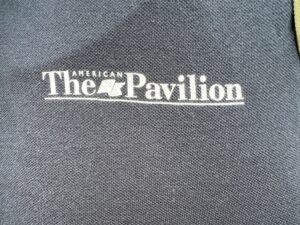
There is an emotional component to most of the interviews I conducted. Many felt misled, ignored, taken advantage of, and unheard. A few representative comments include:
- “I’m scared to tell my parents any of this because they helped me finance part of the trip and I know if I were to tell them they would feel as if I was led astray”
- “I feel heavily mislead”
- “I just feel so taken advantage of, they don’t care about many of their student’s experiences, if any of them. I can’t tell you how disappointed I am”
- “We are all so desperate for connections that we don’t want to speak out”
- “I greatly dislike this program, and I’m glad that someone is saying something. Our professors pushed us to do this hard and also lied to us”
- “I’m currently in the program and overwhelmingly every student I’ve spoken to feels upset”
- “This internship left me …disheartened and feeling misled”
- “I’m honestly devastated that I did not have a similar experience to the people I know who went before me”
There’s a lot right with the AmPav program

Over 90% of the responses I received were negative, but that’s to be expected. People who are unhappy or dissatisfied are far more motivated to respond to a call for comments than those having a great time, or those busying themselves with a successful internship.
I spoke to about 15% of the students on the program, meaning that it could well be the case that the vast majority of AmPav students are having a wholly positive experience. Furthermore, some of the issues listed above could be explained by the unusual nature of 2022 (i.e. backlog of students, meets a lack of practice for the organisers, meets Covid, meets Cannes).
There is much to recommend in the AmPav program. It places a large number of new entrants right into the heart of the film business. It has structures for supporting them and takes away many of the challenges and hurdles they could face on their own. Some of the professors I spoke to pointed out that they didn’t have the knowledge, experience or bandwidth to organise something like this on their own. Without AmPav, there would be far fewer students learning how the film business works.
Some of the positive things students said include:
- “I believe the people that have been saying this (most likely first-years) have a very skewed perception about where this money is going – the fees are necessary to provide adequate accommodation for housing as well as full access to the entire two weeks of the festival; not a single penny is wasted and I have personally seen the AmPav Student Program staff go above and beyond to try and cut these fees down as much as humanly possible. … I would also like to emphasize that this is an internship program, not a vacation program; I believe many of the students who I’ve heard complain about ‘feeling misled’ simply applied with an inaccurate perception on the activities and placed their hopes in the wrong places”.
- “The Ampav program has allowed me to take a monumental step in my film career. I’ve had an incredible amount of access to many different parts of the industry and made potentially lifelong friends. … Yes the price tag is hefty but such is international study programs”.
Where does this leave us?
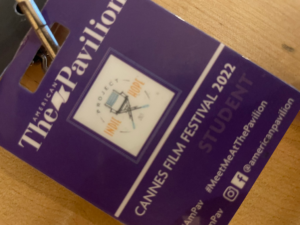
As I said at the top, this story will evolve and change. Some of the issues stated may yet be resolved, some may have already been addressed. For example, as I write, there is uncertainty as to how those testing positive for Covid will be looked after in France once the festival ends. That said, I am confident that between AmPav and their college they will not be abandoned.
The questions that matter to me relate to the bigger picture. In talking to industry professionals while researching this article, a few questions kept coming up:
- Pay to serve. Is it morally right to be charging people to work in unpaid service jobs?
- Shock. Why are students surprised by the state of accommodation and the work they were expected to do? Is this a problem with the communication given in advance and the promises made?
- Discontent. Why are so many students deeply unhappy with their Cannes 2022 experience? Is it just entitled grumbling over understandable teething problems, or does there need to be a re-centring of priorities and communication?
- The future. What should change for Cannes 2023 and beyond?
Epilogue (including a response from AmPav)
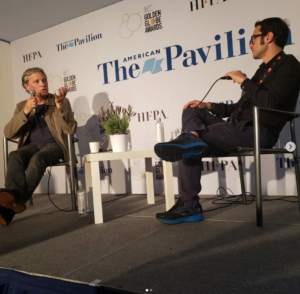
As a white, middle-class male who has a place in the industry, I am privileged to be beyond most of these concerns. To be honest, I didn’t even see them. But now that I have, I cannot ignore them. We as an industry need to do a better job in protecting people than we are right now – in all aspects of the industry.
I reached out to AmPav a few times prior to publication but it wasn’t until a day after release that we finally spoke directly on the issues raised.
This included a long call with people at the top of the program, in which we went through all of the issues noted here. I found them open, honest and willing to engage on all topics.
From my perspective, they really do seem to care about the students and their experience. They were deeply disappointed that the students I interviewed didn’t feel they could engage with AmPav internally on these issues, and it certainly seemed to me that this came from a desire to fix the actual problems, rather than because of any negative publicity this article may have caused.
2022 has been a strange year for everyone, and it feels reasonable to assume that a number of factors came together to exacerbate existing issues and create new ones. AmPav took on the largest number of students they’ve ever had and were also faced with wholly new challenges, such as Covid.
Personally, I am still uncomfortable with an internship program which comes at such a high financial cost, and the sheer number of disappointed/shocked students is concerning (even if they do only represent a minority of those in the program).
But I can see that the people at the very top of the program do focus on helping students engage with the film industry.
Notes
- If I have made a factual error, please contact me or leave a comment. I will fix errors and note them in the Change Log.
- If you have an experience you wish to share, please add a comment or contact me directly, either via this form or via a private message on Twitter. Unless you say otherwise, I will keep all names and identifying information private. I very much want people to go ‘on the record’ if they choose, but I appreciate how some people feel that they may receive reprisals if they were to do so. It’s important I know you are genuine, but I do not need to publish your name.
- If you disagree with anything in this article, please leave a respectful comment or contact me directly. I’m all for debate, I would like to hear differing opinions and there is likely to be a diversity of experiences on this topic. Let’s just keep it civil, please.
- I am not agreeing or disagreeing with the quotes listed above. They are entirely the views of their authors and I have not had any of the experiences mentioned. I am seeking to share other people’s points of view, not make statements beyond my knowledge or training. If I’ve overreached, please contact me and I’ll fix it.
- All quotes are verbatim, except where the original text would reveal personal information, when the context was unclear or edited for brevity.
Images came from Adobe, from AmPav interns and @jenn_bouani.
Responses
- I wanted to add a few direct quotes from AmPav here to further share their perspective:
- The fee: “Students do not “pay to work”. They pay for the overall experience and the program itself, of which the assignment is only a small part. The program fee goes towards covering the costs of the program, which include housing (which is extraordinarily expensive in Cannes during this season), ground transportation, Festival badges, exclusive student lounge and other costs“.
- The work: “Students are given an internship assignment as a way for them to have a role at the Festival, advance their career or educational interests, and experience the Festival and the Pavilion in a more involved and direct manner. Conversations with students regarding their assignment take place long before the program begins, and we work collaboratively with students to determine the best opportunities based on their goals and interests. Students spend 4 hours a day providing services for an outside company or in some function at The American Pavilion and they have their choice of what roles to choose. If they choose to work within the American Pavilion, their roles range from programming panels, social media, ticketing, publicity, videography, hospitality (including restaurant) and a range of other roles that meet their personal and educational interests. Each student is also told, in writing, that they have the right to request a change, at any time, at their option if they are not happy with their assignment. Based on 30+ years of participant feedback, waiting tables and bartending within the Pavilion has received consistently high ratings of popularity from students”.
- Networking: “We do not promote “interacting with celebrities” as a benefit of working at the Pavilion. Students are encouraged to attend celebrity talks taking place at the Pavilion, but we do not suggest that students will be “interacting” with celebrities because of their work within the Pavilion“.
- Accommodation: “The students are housed in efficiency apartments that are rented in France to accommodate 6-7 people. A maximum of four students stay in these apartments. These apartments include a bathroom and a small kitchenette“.
- Covid: “We have followed French and Festival COVID protocols to the letter. All students and staff are required to be fully vaccinated. We have been working around the clock to address all COVID-related matters, including making an abundance of COVID tests available to students, advising and coordinating with students regarding isolation and testing requirements, and re-arranging rooms when students or staff have contracted COVID. Once we confirmed positive cases within our group, we promptly instituted a mask mandate within our student and staff groups in the Pavilion and took other precautions to mitigate further spread. Rooms were set aside from the outset for anyone who tested positive, and we have a plan in place for people who test positive and must stay beyond their scheduled departure date, including providing private hotel accommodations”.
- Safety: “Each student is assigned an advisor, and there are more than 50 staff members (including a mental health professional) on the ground to help and support students throughout the festival. At the beginning of the program, the U.S. Consulate comes to the Pavilion and speaks with the students about France, French customs and safety protocols“.
- Listening to students: “Following each program, we conduct an exit survey with the students, which is used to improve the program from year to year“.
- I have emailed 60+ other pavilions and country representatives to ask if all their staff are paid and if they have any unpaid student schemes. So far, I have had the following responses:
- UK Pavilion and Screen Australia say they pay all their staff and don’t run any unpaid or student schemes.
- Film USA. “Film USA is a non-profit organization to represent film commissions and promote film production across the USA… Our funding is entirely from our sponsors… we are a staff of two: Tony and myself. We are not paid. We have a handful of amazing and supportive friends who have volunteered this year. Our workshops are free, we have free happy hours, and it is a free place open to all to come and sit down and meet people“.
- I have emailed over 80 professors at the colleges listed on the AmPav site. Some have responded privately, but most have not yet. None have gone ‘on the record’ yet. One said:
- “A female colleague of mine who was a mentor in a subsequent year has stopped recommending the program and encouraged the school to do the same. I will be much more direct in my objections in the future. I will also reach out to the students who attended this year, as both are communicative and will be honest with me”
- Another benefit the students have access to during the program is AmPav Roundtable Speaker Series. A member of their team has been in touch to say:
- “Every year, we bring in executives from around the industry to talk for one hour to the students about their jobs, their companies, and the industry at large. This year alone we scheduled 17 hours of talks, only for students, at the pavilion, at varying hours of the day, for 10 days…. This program is designed to help the students understand industry jobs and how to get them, as well as how to succeed as a filmmaker. I feel it’s important to mention this, because there were quotes about how some were desperate to network… From film publicists to acquisition executives to famous actors, they all take time out of their schedule to talk with these students because they feel it is important. And those who took advantage of the talks, made important connections“
Change Log
I will note alterations to the article here.
- Added that AmPav is owned by Penske Media, which also owns The Hollywood Reporter, Deadline, Variety and IndieWire.
- Added professor quote at the end.
- Updated one of the subheadings to reflect that the students get more than just a placement for their fee.
- Removed questions around the legal status of the bar/restaurant work as AmPav have assured me it is all legal. I’m not a lawyer but have no reason to doubt them.
- I have updated the Responses section with the fact AmPav and I have now spoken directly.
- I added some quotes from AmPav to give their perspective.
- I re-wrote my Epilogue. The original was a call for responses, which we’ve now had. My new version is a little more reflective as I feel that the point has been made. It’s now on AmPav to internally deal with the issues raised, and on the film community to decide how we feel about ‘pay to play’ internships.
- Added a quote in Responses section about the AmPav Roundtable Speaker Series as I think it’s a good example of the kind of thing a program like this can offer students, beyond just the placement and apartment.

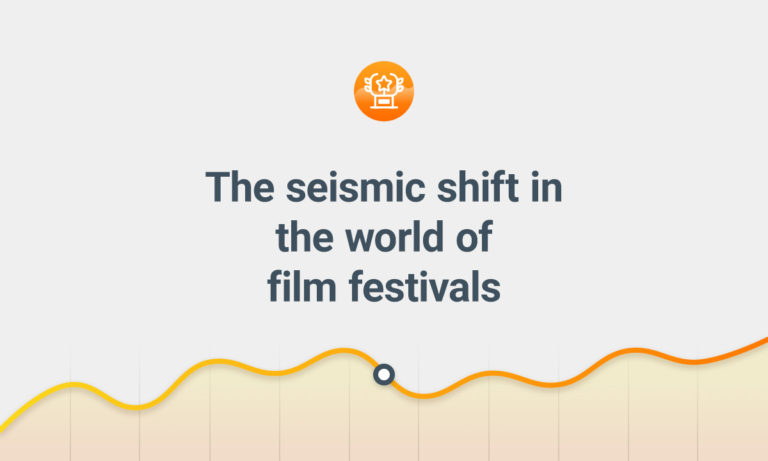

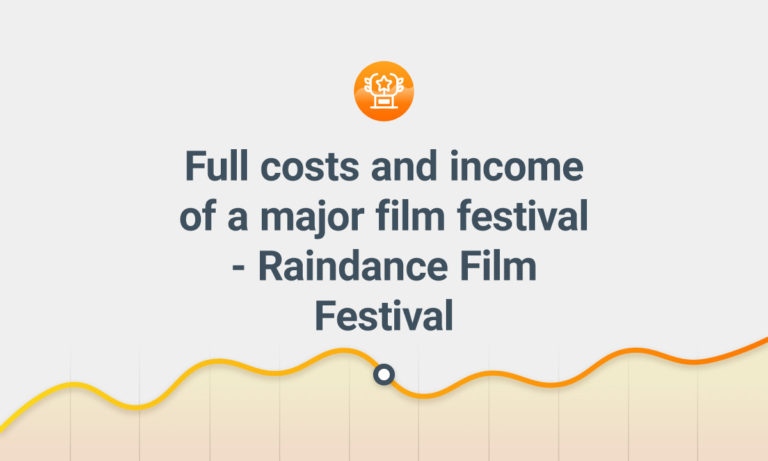

Comments
Great report. It’s notable that Penske Media- who own variety and indiewire among others, as well a a portion of SXSW and on and on – bought AmPav. When they bought it, they were quoted in Variety saying (jaw drops): “Added Sisk: “I’m incredibly proud of what we have built at the American Pavilion over the past three decades. Our physical space has provided a true home for the film industry professionals at Cannes, and our Student and Emerging Filmmaker programs have created a community of young people who have gone on to do amazing things.” Variety: https://variety.com/2022/film/news/penske-media-corporation-cannes-american-pavilion-1235148196/
This is completely shocking and I am thankful for your reporting, Stephen. I hope that the people who I am who have spoken at AmPav programs this year will express their discontent at your findings, both to the organizers personally and in public on social media. The director’s name and email address are listed on AmPav’s website and I have already written to them myself with reference to your article, stating that these exploitative practices need to end.
Hi Herb. I agree with your overall perspective but I don’t think emailing any of the staff is a good idea. They have heard the message and I’m confident there will be changes internally. They do seem to really care about the student experience so I’m willing to give them the benefit of the doubt on the matter of taking the issues seriously.
The wider philosophical issue of internships with such a high cost is something for us a wider film community to reflect on.
Good reporting and definitely needed. One note: if AmPav is telling interns to state they are “tourists”, that’s an indication of illegality to start with. They’re encouraging young students to lie to officials and the consequences of being caught could be drastic. Even if not (caught), AmPav is promoting a behavior and mindset that is detrimental to the individual and the industry. That’s before one is actually involved in the other (negative) aspects you’ve reported on.
Thank you for highlighting these issues.
Hi John.
Thanks for your comment. When I first heard about this aspect of the program I too was worried. However, I have since discovered that they do fully comply with both French and US law.
For me, this removes any issues of illegality or lying but shifts our focus to ethics. Just because something is legal, doesn’t automatically mean we should do it.
S
Thank you for reporting on this – even though your added remarks sound like a wee bit off white washing after the fact. And btw, they definitely do not fully comply with THE law, come on!
Hi Milan
I see what you’re saying. I think all the key information is fully there and I’ve not removed anything the students said. I am glad to give AmPav a chance to put their thoughts along side the intern concerns. It’s a situation with a lot to recommend it and also a lot which I feel needs to change.
On the legal front, I am not a lawyer. I cannot say for a fact either way. AmPav are certain it does comply and I’m in no position to prove otherwise. However, I don’t think that’s the core point. Even if it’s legal, many might still see it as wrong.
Stephen I was surprised to read this. My experience of AMPAV 22 was that the interns (I met anyway) enjoyed the chance to meet with peers together with older and experienced heads. In one 3 way conversation I was talking to a well known “film consultant” who was passing on some very good tips to a 19 year old film student. True there were the regular cohort of fantasists but if you hunted round everyone , and not just interns, could make good contacts that would not be so easy away from AMPAV and Cannes. I hadn’t realised the financial implications for these young people however, I hope they all felt it was worth while. Like so many of these events, however in this world you have to make your own luck, and I would be sorry if some people behaved inappropriately towards these very pleasant youngsters, who are the industry’s future.
At some point, we will evaluate the entertainment content we are consuming for how ethically it was produced. The general public is clueless. We need to do better across the board. Thank you for sharing these details.
Honestly, this seems a field trip to the “abusement” park. A high priced, high stakes, perilous at every turn roller coaster ride, through the more glaring aspects of the film industry. Shiny objects everywhere, many with sharp edges or bad after – tastes. Let us not pretend, if one is determined enough to summon the entry fee, a calculated desire for exhilaration likely promises a ride filled with deception and exploitation. It’s running the gauntlet that matters. #reallifeskills
1st thing first. I need someone to answer the fundamental question of college level INTERNS paying $4,000 for their own internship experience(s) NOT including plane tickets. I will wait for someone to justify this no matter how long it takes.
I worked as a staff member a number of years ago and would never do it again or recommend staffing or interning at Ampav to anyone. I had been to Cannes twice before that with a background doing corporate events as well as years of film festival board and staff experience. They were very disorganized; prep, logistics and communications were pretty poor and hours were very long. There was not enough staff to handle the various technical and facility issues because they only pay what amounts to about a $50/day stipend. Accomdations were one star, cramped flats and quite a distance from town. It’s the only for profit Pavilion on international row hence the low staff pay and high internship costs. Sr staff (publicists, recruiters, etc) and directors however stay in very nice, in town flats and I assume are paid a decent wage. Sponsors were not treated all that well either with major sponsors unable to bring in guests for meetings w/o a lot of hassle.As far as the internships, def not worth the fee especially if you’re stuck staffing the pavilion scanning badges, waiting tables, etc. I believe some students do get to work the film market in various capacities, which is better but still costly for what it is. Only real perk was screening tickets and a credential, both which can be had on your own with a little research, some $ and networking. Ampav is basically an expensive Cannes on training wheels and most students would be better off doing a lot of research and arranging their own Cannes trip/internships.